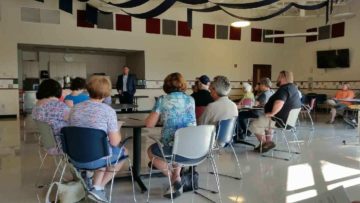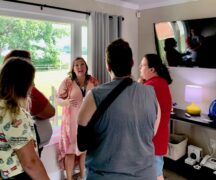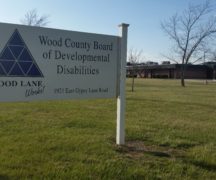By JAN LARSON McLAUGHLIN
BG Independent News
The work at Wood Lane Industries will soon be moving – along with two-thirds of the people with developmental disabilities who are served there. The work and the workers will be setting up shop in a storefront on Main Street in Bowling Green – an exciting opportunity for the people being served, organizers said.
But the concern now is that 41 of the 125 workers will be left behind, with little time to find alternate services for them.
Families of people with developmental disabilities met this past week in the industries building on East Gypsy Lane Road, to get as many answers as possible. Many expressed concerns about change being especially difficult for people with developmental disabilities. They and their families are comforted by consistency in settings, staff and services.
Brent Baer, superintendent of the Wood County Board of Developmental Disabilities (known as Wood Lane to many), apologized to the families for the hastily organized meeting. But he explained that the board felt the need to act quickly to try to find new providers for adult services.
“I realize this is a shock to many of you,” Baer said.
The board was notified about two weeks ago that the services at the industries location would be moving by the end of this year.
“This is a pretty monumental transition for us, and it’s certainly not one we asked for,” Baer said. “I know this is going to be a huge challenge.”

Brent Baer talks with families in industry building.
Wood Lane has been through several changes in the last few years – with most affecting administration while the services remained consistent. The changes to all development disability services across the state were necessitated by a requirement that the same agencies that assess the needs of people with developmental disabilities cannot also provide the services to meet those needs. That meant that Wood Lane’s adult services had to be privatized.
Residential services were the first to be privatized, followed by adult vocational services in 2016. The former Wood Lane Industries became wli, which now stands for Work Leads to Independence. The Wood County Board of Developmental Disabilities contracts for services with the privatized residential and vocational providers.
Up until now, wli has continued to use the former Wood Lane Industries building, plus offered employment for people with developmental disabilities at Laser Cartridge Express on Fairview Avenue, and Community Employment Services which has an office on Newton Road.
This change will allow wli to put all its services under one roof – though it can’t officially announce where that roof is.
Vic Gable, CEO of wli, said earlier this week that the deal had not yet been closed on the new location, though he did say it is on Main Street in Bowling Green. The move will make services more efficient, plus make the entity more visible since it will have a storefront.
“This allows us to meet our vision,” Gable said. The contracts with businesses currently in place at the industries will move with wli to the new location.
“We’ve been working on this with the county board for awhile,” he said. “They have been a great partner with us and will continue to be a great partner with us.”
Gable said workers served by the program can decide whether or not they would like to make the move to the new site.
Baer said his understanding is a little different. He has been told that moving to the new location will not be an option for 41 of the workers with the greatest medical and behavioral needs. Baer said the board has no qualms with wli moving its services – it just has concerns about finding new vocational services for those 41 being left behind.
So the board has sent out requests for services to 700 agencies that provide vocational options for people with developmental services. It’s possible the board will find multiple providers to offer work options.
“We’re all losing sleep over this, but this is the right thing to do,” Baer said. “We want to create as many choices and options for people who are being served.”
Baer tried to calm the families that the board is acting quickly to find alternative vocational services.
Family members at the meeting asked to be a part of the decision-making process. They requested that names of provider finalists be shared with them so they can research them, and that possibly families be allowed to sit in on the interviews.
“I’m a little nervous about how this is going to work,” one parent said during the meeting.
Baer assured that the board’s goal is to find vocational services that give people work choices.
“We want people to choose where they are going and not be told where to go,” he said.





